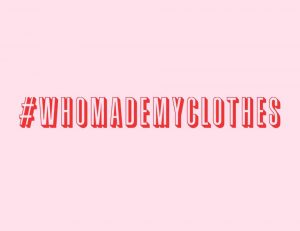Von Ange-Camea Robinson

Imagine this: you go to work every morning, sit at a sewing machine under male supervision and work until 8pm in the evening. If you’re lucky. Most of the time you have to do more overtime hours to meet the deadlines of fashion retailers such as H&M, Mango Primark, you name it. Sometimes you do long overtime hours to earn a little more to provide for your family. And although by law, you’re supposed to get compensated for your overtime (double the wage), you either get undercompensated or not compensated at all.
And imagine further that if you go to your manager and demand pay, he would threaten you with dismissal.
Sure, here in the West if that happened to us we’d go to our representatives and demand our pay. We would also demand better and safe working conditions. As for me, I would not enter a building which could collapse any time due to structural failure. I would not work in a place where faulty electrical wirings may cause a fire. I simply would not do it.
And lucky for me, I don’t have to.
Not so lucky for the 60 to 75 million textile, garment and footwear workers worldwide who have to work in hazardous working places. They don’t have a choice.
You might say: “join a union! Your manager has to give in if it’s a few hundred people demanding their pay, a safer workplace, and doable deadlines”
Sadly, it’s not that easy. In the garment manufacturing industry, at least 80 % of the workers are women; most of whom have to support a family of at least three people. As their families depend on their income, the garment workers are in fear of losing their jobs. So, of course, they think twice before demanding anything.
And it’s not only about losing their job. As a woman, you are more likely subjected to sexual harassment, verbal and physical abuse as men. Sexual harassment is something female garment workers are experiencing all over the industry; no matter which country. Managers and employers take advantage of cultural stereotypes where women are inexperienced, often illiterate and desperate for a job.
There are numerous reports of female employees stating that girls have been harassed by their managers and supervisors. Also, women work under the fear of being assaulted or raped on their way home from work.
And if that’s not enough, women are also discriminated against when it comes to family planning. Family planning is a quite personal affair and no other’s business but your own (and your partner’s). But in the garment industry, things are a bit different. Factory owners and managers sometimes only hire unmarried women with no children or they make women sign an agreement to not have children while being employed.
According to the Worker’s Rights Consortium report on garment workers in Vietnam, female workers face pregnancy-based discrimination including termination of employment or the denial of maternity benefits. In other cases, women were forced to use contraceptives to make sure they don’t get pregnant. It’s crazy when you think of it; the one thing you were born with – your body – doesn’t even belong to you.
These patriarchal forms of male control over women serve as means to consolidate their power and maximise production in garment factories. Sexual harassment at work serve no other purpose than to make a person feel humiliated, intimated and vulnerable. And when you’re being intimated, you are less likely to speak out when you face gender-discrimination of any kind and inhumane labour conditions, in fear of retribution. More often, women do not even know that they have any rights at all, as managers are not that interested in enlightening their workers on labour regulations, rights and laws.
And if some do have the courage to join a union or form an association at work, they might get dismissed or even beaten up. Even in developed countries, women still face gender-based discrimination. Just take the gender pay gap. We are paid less for the same position. Sexual violence against women – psychological and physical, intimidation, poor sanitation, pregnancy-based discrimination, low wages. It’s a widespread disease in the garment and fashion industry.
Additionally, factories are owned by men, so having a female employer? Not so likely. The better jobs that pay more – such as supervision – go to men. You do find women in the position of a supervisor, but that’s rather rare. Promotion or any form of perspective? Not the case.
So, why am I dropping the provocative F-bomb? Feminism is a powerful word. And it’s important that we use it and teach what it means and of course, what it doesn’t mean. Too often, people confuse feminism as a synonym for “women hating men”. But that’s not the case. I’m a feminist. I stand for equality of the sexes and gender, whatever they may be. Although I could also argue, that my beliefs make me a humanist, but that would divert the focus from the struggles women have to face every day all over the world in different forms and shapes.
So yes, the garment industry is a feminist’s worst nightmare. When you stand for social, political, economic and personal equality of the sexes (as Chimamanda Ngozi Adichie defines it), this industry is the opposite of everything you believe in.
Sources:
http://www.cleanclothes.org/issues/gender
http://www.solidaritycenter.org/
http://www.usfashionindustry.com/pdf_files/WRC-Report-Vietnam.pdf
The True Cost; Documentary by Andrew Morgan
